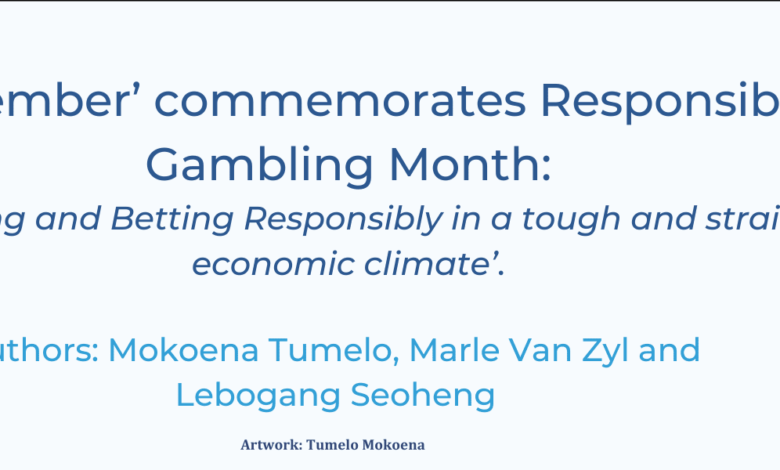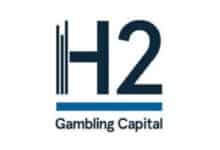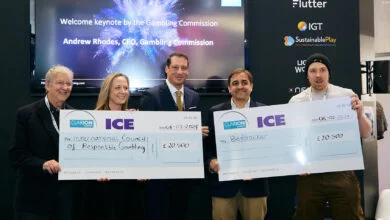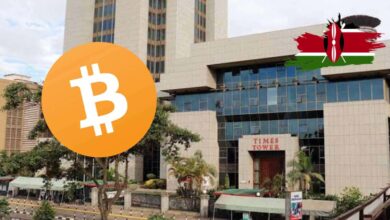Gambling and Betting Responsibly in South Africa: Insights from South African Responsible Gambling Foundation

This edition discusses the evolution of the South African Responsible Gambling Foundation, provides context into why November was declared Responsible Gambling Month, and discusses the use of Cognitive Behavioural Therapy to treat Disorded Gambling through the National Responsible Gambling Programme. Furthermore, insights into NRGP treatment and counselling referral statistics for disordered gambling from 2021 to date. Africa
With almost two (2) decades of providing Free Treatment and Counselling to individuals negatively affected by the potential harmful effects of gambling, the South African Responsible Gambling Foundation (“Foundation”) is set to celebrate a twenty (20) year anniversary in May 2024. Since the current Executive Director, Mrs Sibongile Simelane-Quntana, took over the leadership of the Foundation, the National Responsible Gambling Programme (NRGP), which is its flagship programme, has provided treatment and counselling to over 22 350. The gambling industry, which consists of casinos, betting, bingo, and limited pay-out machines, has over the years sustained the work of the NRGP through its financial contribution of 0.1% of the industry’s Gross Gambling Revenue (GGR) (i.e., money staked less money paid out in winnings) and enables continuous growth and development of its service offerings. The Foundation has thus, over the years, evolved and expanded its service offerings beyond the toll-free counselling line. South Africa Responsible Gambling
These developments include stakeholder-targeted programmes and services that assist the Foundation in adapting to the ever-changing gambling landscape. These developments are inclusive of (i) Research and Knowledge Application, which is aimed at increasing the understanding of gambling trends, problem gambling and the socio-economic impact of gambling in South Africa to provide appropriate interventions; (ii) Advocacy and Stakeholder Mobilisation; which advocates for responsible gambling, create awareness on problem gambling and collectively address exposure of vulnerable groups (children, teenagers, elderly, and social grant recipients) to potential harmful effects of gambling behaviour. This includes creating awareness of early intervention. Lastly, (iii) Industry Development Training and Support, which is aimed at providing ongoing education, training, and development to gambling boards, the gambling industry, managers and employees, healthcare workers, and a range of other industry sectors on problem gambling and related issues and how to identify, manage and refer them for professional intervention. Over 7,539 industry trainings to support gaming employees have been conducted.
In 2016, Mrs Simelane-Quntana conceptualised the November Responsible Gambling Month concept, which over the past 7 seven has since been designated as the national period to advocate Responsible Gambling behaviour as we move towards the festive season and commemorate the 16 days of Activism. During this period, the gambling industry collectively increases awareness around Problem Gambling and its adverse effects and promotes Responsible Gambling. The “Foundation’s” theme for this National Responsible Gambling Month is ‘Gambling and Betting Responsibly in a tough and strained economic climate’. The festive season, typically the end of the year, encompasses Christmas and New Year celebrations, various cultural and religious festivities, family gatherings, and a general sense of joy and celebration. Many people take time off from work as most companies close and schools are closed. Furthermore, this time of the year allows for outdoor activities, and many people take advantage of the holiday season to go on vacations, explore the country, or spend time at gambling establishments.
It is worth noting that leading up to this time of the year, employees usually receive pay benefits such as bonus pay-outs, and some have their December salaries in advance. The gambling industry, travel and tourism are interconnected in several ways that position gambling as a central feature of travel and tourism attractions. The goal is to provide a comprehensive holiday experience that caters to a diverse range of interests. It’s important to note that the nature and scale of these integrated resorts can vary, and not all gambling operators position themselves as holiday destinations in this way.
The Foundation has identified challenges through an influx of counselling-line calls, particularly concerning disordered and irresponsible gambling, especially during the festive season. This has been an indication that some people engage in excessive gambling during this period. It is, therefore, vital to strengthen messages of responsible gambling leading up to and during this time to ensure responsible gambling behaviour and minimise harm through broad access to information and spreading awareness.
The most recent NRGP Treatment and Counselling Referrals statistics dated 1 April 2022 to 31 March 2023 are as follows:
• Problem Gamblers: 2 200
• Self- Exclusions: 1 339
• Telephone Counselling: 384
• Relapses: 44
• Family Referral: 91
Over the 2022/2023 financial year to quarter 2 of the 2023/2024 financial year, 25 clients were admitted for in-patient Treatment Services.
Read Also: Pragmatic Play Festive Season Giveaway Terms and Conditions
The Therapeutic Approach utilised by NGRP Treatment, Counselling and Social Services to treat Problem Gambling: Cognitive Behavioural Therapy (CBT)
Compulsive gambling can inflict severe hardships on individuals and their families, resulting in financial distress, emotional turmoil, and other adverse repercussions. Tackling this issue calls for a comprehensive psychological strategy that considers the intricate interplay of factors influencing gambling behaviour. Cognitive Behavioural Therapy (CBT) is a highly effective approach to problem gambling (Cowlishaw et al., 2012; Menchon et al., 2018; Yakovenko & Hodgins, 2016).
CBT, a widely acknowledged psychological treatment, centres on identifying and modifying negative thought patterns and behaviours (Hofmann et al., 2012). In the context of problem gambling, CBT assists individuals in recognising and challenging irrational beliefs and distorted thinking associated with gambling. The goal is to enhance awareness of triggers and consequences, empowering individuals to cultivate healthier coping mechanisms and problem-solving skills (Petry, 2006).
The initial phase of CBT for problem gambling involves psychoeducation, where individuals gain insights into the nature of addiction and its impact on the brain. Understanding the psychological mechanisms behind their behaviour enables individuals to grasp the driving factors behind their gambling habits and associated risks. CBT also underscores the importance of setting achievable goals and devising strategies to manage cravings and urges (Myrseth, 2009).
Another integral facet of CBT is the cultivation of coping skills. Through cognitive restructuring, individuals learn to identify and challenge automatic thoughts and cognitive distortions contributing to their gambling behaviour (Hofmann, 2012). This process facilitates the development of more adaptive and realistic thought processes, thereby reducing the likelihood of impulsive or reckless gambling.
Additionally, CBT incorporates behavioural interventions, such as self-monitoring, where individuals track their gambling behaviour and related triggers. Maintaining a record of actions, emotions, and circumstances surrounding gambling episodes enables individuals to comprehend patterns and triggers contributing to problematic behaviour. This self-awareness is pivotal in formulating effective coping strategies and relapse prevention techniques Abbott et al, 2016).
Beyond individual therapy, CBT can be applied in group settings or as part of a comprehensive treatment program, including family therapy and support groups. Involving family members in the therapeutic process fosters a robust support network, promoting understanding and empathy, ultimately enhancing treatment outcomes (Abbott et al, 2016.
Conclusion
While CBT has proven efficacy in addressing problem gambling, it is imperative to acknowledge the uniqueness of each individual’s experience with gambling addiction. Hence, a personalised and holistic approach integrating various therapeutic techniques and support systems is essential to address the multifaceted nature of problem gambling. (Myrseth et al, 2009) By offering a secure and supportive environment for individuals to explore their thoughts, emotions, and behaviours, CBT presents a promising path toward enduring recovery and improved well-being for those grappling with problem gambling. In conclusion, it is crucial that the public is aware of the dangers of excessive gambling and highlights responsible gambling to ensure that gambling is always approached with the responsibility to minimise harm.
For Free Confidential Treatment and Counselling, Call our toll-free Counselling Line 0800 006 008 or WhatsApp Help 076 675 0710.
References
Cowlishaw, S., Merkouris, S., Dowling, N., Anderson, C., Jackson, A. & Thomas, S. (2012). Psychological therapies for pathological and problem gambling. Cochrane Database of Systematic Reviews, 2012 (11), 1–91. https://doi.org/10.1002/14651858.CD008937.pub2.
Hofmann, S. G., Asnaani, A., Vonk, I. J., Sawyer, A. T., & Fang, A. (2012). The Efficacy of Cognitive Behavioral Therapy: A Review of Meta-analyses. Cognitive therapy and research, 36(5), 427–440. https://doi.org/10.1007/s10608-012-9476-1
Menchon, J.M., Mestre-Bach, G., Steward, T., Fernández-Aranda, F. & Jiménez-Murcia, S. (2018). An overview of gambling disorder: From treatment approaches to risk factors. F1000Research, 7 (434). https://doi.org/10.12688/f1000research.12784.1.
Myrseth, H., Litler`e, I., Støylen, I. J., & Pallesen, S. (2009). A controlled study of the effect of cognitive-behavioural group therapy for pathological gamblers. Nordic Journal of Psychiatry, 63(1), 22–31. https://doi.org/10.1080/08039480802055139
Petry NM, Ammerman Y, Bohl J, Doersch A, Gay H, Kadden R, Molina C, Steinberg K. Cognitive-behavioral therapy for pathological gamblers. J Consult Clin Psychol. 2006;74:555–567.
Yakovenko, I. & Hodgins, D. C. (2016). Latest developments in treatment for disordered gambling: Review and critical evaluation of outcome studies. Current Addiction Reports, 3 (299). https://doi.org/10.1007/s40429-016-0110-2.
Source: South African Responsible Gambling Foundation
By: Tumelo Mokoena, Marle Van Zyl and Lebogang Seoheng South Africa Responsible Gambling























